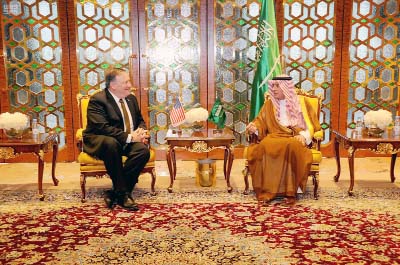
AP, Riyadh :
U.S. Secretary of State Mike Pompeo is using the Middle East leg of his first trip abroad as America’s top diplomat to call for concerted international action to punish Iran for its missile programs.
He’s also urging Saudi Arabia and its neighbors to resolve a long-festering dispute with Qatar that U.S. officials say Iran is exploiting to boost its influence in the region, including in Yemen and Syria.
Pompeo met Sunday with Saudi King Salman, whose country, along with Bahrain, Egypt and the United Arab Emirates, is embroiled in a row with Qatar that had hobbled Gulf Arab unity and frustrated the U.S. as it seeks to blunt growing Iranian assertiveness.
The ex-CIA chief had arrived in Riyadh a day earlier, shortly after Iranian-backed Houthi rebels in Yemen fired missiles at Saudi Arabia’s southern city of Jizan, killing one person and underscoring what U.S. officials said is a growing threat emanating from Iran.
Senior U.S. officials traveling with Pompeo blamed Iran for smuggling the missiles into Yemen. They said the incident highlighted the importance of the Trump administration’s push to counter Iran in the region. Iran has also provided crucial support to Syrian President Bashar Assad.
“Iran destabilizes this entire region,” Pompeo said in brief remarks to journalists with Saudi Foreign Minister Adel al-Jubeir, taking no questions. While not mentioning Qatar by name, Pompeo also stressed that Gulf unity was “essential.”
Al-Jubeir said the kingdom “supports the policy of the Trump administration against Iran and to improve the terms of the nuclear agreement with Iran.”
Senior U.S. officials, who were not authorized to preview Pompeo’s discussions with the Saudi leadership and spoke on condition of anonymity, said he would make it clear to the Saudis that the dispute with Qatar must end.
Mediation efforts led by Kuwait and supported by the U.S., including former Secretary of State Rex Tillerson, who Trump fired last month, have proven unsuccessful. The split gives Iran “room to play” and hampers cooperation on a wide array of other issues, including combatting violent extremism from the Islamic State and other groups, the officials said.
The officials said Pompeo would call on other nations to impose tougher sanctions against Iranian individuals, businesses and government agencies involved in missile development. They said he’d also stress the U.S. commitment to the defense of Saudi Arabia, Israel and other friends and partners in the region. Pompeo will also press the Saudis on contributing more to stabilization efforts in territory in Syria recently liberated from the Islamic State group, the officials said.
U.S. Secretary of State Mike Pompeo is using the Middle East leg of his first trip abroad as America’s top diplomat to call for concerted international action to punish Iran for its missile programs.
He’s also urging Saudi Arabia and its neighbors to resolve a long-festering dispute with Qatar that U.S. officials say Iran is exploiting to boost its influence in the region, including in Yemen and Syria.
Pompeo met Sunday with Saudi King Salman, whose country, along with Bahrain, Egypt and the United Arab Emirates, is embroiled in a row with Qatar that had hobbled Gulf Arab unity and frustrated the U.S. as it seeks to blunt growing Iranian assertiveness.
The ex-CIA chief had arrived in Riyadh a day earlier, shortly after Iranian-backed Houthi rebels in Yemen fired missiles at Saudi Arabia’s southern city of Jizan, killing one person and underscoring what U.S. officials said is a growing threat emanating from Iran.
Senior U.S. officials traveling with Pompeo blamed Iran for smuggling the missiles into Yemen. They said the incident highlighted the importance of the Trump administration’s push to counter Iran in the region. Iran has also provided crucial support to Syrian President Bashar Assad.
“Iran destabilizes this entire region,” Pompeo said in brief remarks to journalists with Saudi Foreign Minister Adel al-Jubeir, taking no questions. While not mentioning Qatar by name, Pompeo also stressed that Gulf unity was “essential.”
Al-Jubeir said the kingdom “supports the policy of the Trump administration against Iran and to improve the terms of the nuclear agreement with Iran.”
Senior U.S. officials, who were not authorized to preview Pompeo’s discussions with the Saudi leadership and spoke on condition of anonymity, said he would make it clear to the Saudis that the dispute with Qatar must end.
Mediation efforts led by Kuwait and supported by the U.S., including former Secretary of State Rex Tillerson, who Trump fired last month, have proven unsuccessful. The split gives Iran “room to play” and hampers cooperation on a wide array of other issues, including combatting violent extremism from the Islamic State and other groups, the officials said.
The officials said Pompeo would call on other nations to impose tougher sanctions against Iranian individuals, businesses and government agencies involved in missile development. They said he’d also stress the U.S. commitment to the defense of Saudi Arabia, Israel and other friends and partners in the region. Pompeo will also press the Saudis on contributing more to stabilization efforts in territory in Syria recently liberated from the Islamic State group, the officials said.

